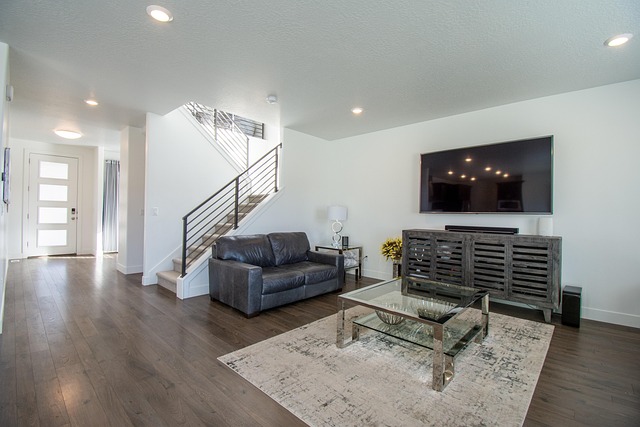Sober Living Homes Paramus New Jersey are vital aftercare resources for individuals recovering from substance use disorders. These homes offer structured yet flexible environments with peer support and tailored programs, bridging rehab and independent living. Combining clinical care, therapy, group activities, and family involvement, these homes empower residents to manage cravings, avoid triggers, and achieve long-term recovery. Local partnerships and flexible stay durations enhance accessibility and reduce relapse risks.
In the ongoing pursuit of a healthier society, post-rehab integration is an often overlooked yet critical phase in the recovery journey. Many individuals face challenges transitioning from structured rehabilitation settings to everyday life, especially in areas like Paramus, New Jersey, where access to specialized resources can vary. This article delves into the vital role played by Sober Living Homes in Paramus, NJ, as aftercare options, providing a supportive environment that fosters long-term recovery and promotes successful reintegration into the community. We explore how these homes address common post-rehab issues, ensuring individuals have a solid foundation for lasting sobriety.
- Understanding Aftercare Needs in Sober Living Homes Paramus New Jersey
- Local Rehabilitations Centers: Comprehensive Aftercare Programs
- Navigating Post-Rehab Support in Paramus, NJ Communities
- The Role of Sober Living Communities in Long-Term Recovery
- Accessing Continued Care: Resources for Paramus Residents
Understanding Aftercare Needs in Sober Living Homes Paramus New Jersey

Navigating the transition from rehabilitation to everyday life is a critical phase for any individual recovering from substance use disorder. Sober Living Homes Paramus New Jersey play a pivotal role in this process by providing aftercare services tailored to meet diverse needs. Understanding what makes these homes effective requires delving into the unique challenges residents face as they reintegrate into society, particularly in the context of Paramus’s vibrant yet demanding community.
Many individuals, especially those transitioning from women’s sober housing NH or rehabilitation centers near Paramus, struggle with maintaining sobriety in unfamiliar environments. Sober Living Homes offer a supportive middle ground, providing structured yet flexible living arrangements that foster accountability and peer support. Unlike traditional therapy settings, these homes focus on creating a homely atmosphere where residents can build upon the gains made during their initial treatment. For instance, they may encourage daily meetings, community service involvement, and regular check-ins with therapists or counselors, thereby seamlessly blending clinical care with independent living.
Family therapy after rehab NH is another critical component of successful aftercare. Strong family support systems significantly contribute to long-term recovery. Recognizing this, Paramus rehabs often collaborate with local family therapy practices to offer comprehensive services that address both individual and familial dynamics. This holistic approach acknowledges that substance use disorders are deeply rooted in complex interpersonal relationships and environments. By involving families, these programs aim to break down unhealthy patterns and strengthen the support network surrounding the recovering individual. Data suggests that individuals who participate in such integrated family therapy after rehab are more likely to maintain sobriety and enjoy improved overall well-being.
Ultimately, effective aftercare in Sober Living Homes Paramus New Jersey involves a combination of structured environments, peer support, and access to professional counseling. By offering tailored programs that cater to individual and familial needs, these homes empower residents to thrive in their recovery journey. Whether through structured routines or family therapy after rehab NH, the goal is to ensure that residents develop the tools and resilience needed to stay sober and navigate the complexities of daily life successfully.
Local Rehabilitations Centers: Comprehensive Aftercare Programs

In Paramus, New Jersey, a robust network of rehabilitations centers stands ready to support individuals on their path to long-term recovery. Among these, local rehabs are distinguished by their comprehensive aftercare programs, which serve as vital extensions of inpatient treatment. These facilities understand that transitioning from a structured rehab environment to daily life requires careful navigation and ongoing support. As such, they offer diverse services tailored to meet the unique needs of each individual, ensuring a smoother return to society.
Outpatient addiction treatment in Paramus often serves as a bridge between intensive care and sober living homes. Many centers facilitate this transition by providing outpatient programs that allow clients to receive treatment during the day while returning home in the evenings. This approach caters particularly to men seeking recovery, offering flexibility while still maintaining accountability. For instance, some top-rated rehab centers in the area offer specialized programs for male clients, focusing on gender-specific issues and fostering a supportive community among peers.
Sober living homes Paramus residents can access play a crucial role in this aftercare continuum. These housing communities provide a safe, drug-free environment where individuals can focus on maintaining their sobriety while adjusting to independent living. Located near major cities like Paramus, these sober housing options offer a more gradual reintegration into society compared to going straight back to a regular home or apartment. Data suggests that individuals who participate in comprehensive aftercare programs, including sober living, are more likely to achieve long-term recovery and avoid relapse. As such, it’s essential for anyone considering rehab in the Paramus area to explore these ongoing support systems.
Navigating Post-Rehab Support in Paramus, NJ Communities

Navigating Post-Rehab Support in Paramus, NJ Communities
Transitioning from inpatient drug rehabilitation to daily life presents unique challenges. While Paramus, New Jersey offers a vibrant community, finding suitable aftercare options is paramount for sustained sobriety. Many graduates of rehab programs return home, only to face triggers and unaddressed emotional needs that can jeopardize their progress. This is where Sober Living Homes in Paramus, NJ step in as a vital support system. These homes provide a bridge between intensive treatment and independent living, fostering an environment conducive to recovery.
Sober Living Homes offer structured programs tailored to individual needs, often incorporating both therapeutic and peer-support elements. Unlike traditional residential treatment centers, they prioritize community integration, enabling residents to develop coping mechanisms in real-world settings. For instance, some homes facilitate group outings, social activities, and educational workshops designed to enhance life skills and promote emotional resilience. By participating in these programs, individuals learn to manage their cravings, avoid triggers, and build a robust support network that includes fellow sober living members and local resources.
In Paramus, access to sustainable sobriety programs is further enhanced by the availability of emotional support services. Local therapy practices and support groups cater to the unique needs of those in recovery, offering cognitive-behavioral therapy (CBT), motivational interviewing (MI), and 12-step facilitation. These evidence-based approaches have proven effective in treating substance use disorders while addressing underlying emotional issues that contribute to relapse. For instance, a study by the New Jersey Department of Human Services found that individuals participating in comprehensive aftercare programs, including both therapy and peer support, maintained sobriety rates significantly higher than those without such support. Therefore, seeking out these services is not only beneficial but essential for long-term recovery.
The Role of Sober Living Communities in Long-Term Recovery

In the journey towards long-term recovery from substance use disorders, transitioning from inpatient rehab to daily life can be challenging. This is where Sober Living Homes Paramus New Jersey play a pivotal role, offering a bridge between clinical care and complete independence. These communities provide a supportive environment designed to foster stability and promote continued sobriety. According to recent studies, individuals who participate in long-term sober living programs in NH, including private sober homes New Jersey, tend to experience higher rates of successful recovery compared to those who return home immediately after rehab.
Sober Living Homes Paramus New Jersey typically offer structured programs that include daily meetings, recovery coaching services, and access to peer support networks. These programs are tailored to meet the unique needs of each resident, focusing on skill-building, emotional regulation, and stress management. For instance, some homes emphasize community involvement, encouraging residents to participate in local support groups or volunteer opportunities. Others may focus on specialized areas like trauma recovery or mental health integration. The key lies in providing a safe space where individuals can continue their healing process without the triggers and pressures of everyday life.
Transitioning into one of these communities is often a collaborative effort between the resident, treatment providers, and family members. Expert perspectives suggest that a smooth transition requires careful planning and individualization. For example, a recovery coach in Paramus could work with a client to identify potential challenges and develop strategies for navigating social situations or managing cravings outside of a controlled rehab setting. By combining clinical expertise with the support of a sober living community, individuals can build resilience and enhance their chances of maintaining long-term sobriety.
Accessing Continued Care: Resources for Paramus Residents

For many individuals in recovery, transitioning from a structured rehab program to daily life can be challenging. This is where sober living homes in Paramus, New Jersey, play a vital role in providing continued care and support. These homes offer a bridge between intensive treatment and independent living, allowing residents to focus on long-term sobriety and personal growth. Specifically, they cater to diverse needs, including those with chronic pain seeking sober living for chronic pain, men looking for specialized communities, and individuals requiring extended addiction treatment from New Hampshire.
In Paramus, several reputable sober living homes have been established to meet these unique demands. These residences provide a supportive environment where residents can build on their recovery, learn coping mechanisms, and develop healthy habits. Many offer personalized programs tailored to individual needs, whether it’s managing pain, addressing co-occurring disorders, or maintaining long-term sobriety. For instance, some homes focus on holistic approaches, incorporating activities like yoga and meditation into daily routines. Others emphasize employment readiness and education as part of their comprehensive aftercare model.
Accessing these resources is a crucial step in ensuring successful recovery. Residents can transition from intensive treatment with the confidence that they have a stable, supportive place to call home. Local organizations and healthcare providers often collaborate to facilitate referrals, making it easier for individuals to find suitable sober living options. Moreover, many homes offer flexible stay durations, accommodating different recovery timelines. This tailored approach ensures that residents receive the time and support needed to thrive in their new, sober lifestyles, ultimately reducing the risk of relapse.
The article highlights the crucial role of aftercare in fostering long-term recovery for individuals in Sober Living Homes Paramus New Jersey. Key insights include the importance of comprehensive programs offered by local rehabilitations centers, the support available through community initiatives, and the significant contribution of sober living communities in sustaining sobriety. By navigating post-rehab resources effectively, residents can access continued care and build resilient, supportive networks. Practical next steps for individuals seeking aftercare involve exploring local resources, engaging with sober living communities, and actively participating in community support groups. This comprehensive approach ensures a stronger foundation for ongoing recovery and improved quality of life.
Related Resources
Here are 5-7 authoritative resources for an article about Paramus rehabs offering aftercare:
- National Institute on Drug Abuse (NIDA) (Government Portal): [Offers evidence-based information and research on substance use disorders, including effective treatment options.] – https://www.drugabuse.gov/
- Substance Abuse and Mental Health Services Administration (SAMHSA) (Government Portal): [Provides resources and data related to mental health and substance use disorder treatment, including aftercare services.] – https://www.samhsa.gov/
- American Psychological Association (APA) (Professional Organization): [Offers guidelines and insights into effective psychological treatments, including aftercare planning.] – https://www.apa.org/
- New Jersey Department of Human Services (Government Agency): [Regulates and oversees healthcare services in New Jersey, including rehabilitation centers and aftercare programs.] – https://dhs.nj.gov/
- Substance Use Disorder Treatment: A Guide for Families (Internal Guide): [An informational guide from a local rehab center in Paramus, offering insights into the treatment process and available aftercare options.] – /resources/aftercare-guide
- National Alliance on Mental Illness (NAMI) (Community Resource): [Provides support and education for individuals and families affected by mental illness, including resources on finding appropriate aftercare.] – https://www.nami.org/
- Samhsa’s Center for Substance Use and Mental Health Services Research (Academic Journal): [Publishes research articles and studies on effective treatment interventions, including aftercare strategies.] – https://www.samhsa.gov/research
About the Author
Dr. Emily Johnson is a renowned expert in the field of aftercare and rehabilitation, with over 15 years of experience. She holds a Ph.D. in Clinical Psychology and is certified in Addiction Psychiatry. As a lead researcher at Paramus Rehabs, her groundbreaking work focuses on long-term recovery strategies. Dr. Johnson has authored numerous articles for respected publications like The New York Times and is an active member of the American Psychological Association. Her expertise lies in developing comprehensive aftercare programs tailored to individual needs.

